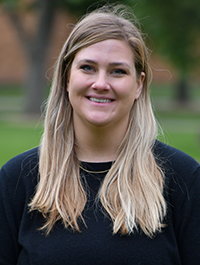
We will help you/your student feel at home

The services available from the Disability Resource Center (DRC) at U of M Crookston may be an important factor in your college choice. We are excited to meet students and families when they come on campus, or we can Zoom, call or email to answer any questions you may have.
Tayler Bryant
broek016@umn.edu
218-281-8587
247 Sargeant Student Center
Frequently Asked Questions
Please look below for a list of frequently asked questions and some information on how to prepare your student for college.
Q. Is my disability confidential?
Student disability records are confidential and are not stored with other student records on campus. We recognize the right of the student to disclose their disability as they deem necessary. Accommodation letters that go to the faculty do not disclose the disability.
Q. How do I get my accommodations?
Request accommodations online. You can call our office anytime to discuss possibilities.
Q. How are high school and college accommodations different?
College access is mandated by A.D.A. (Americans with Disabilities Act of 1990) and Section 504 of the Rehabilitation act of 1973. High Schools are under legislation called I.D.E.A. (Individuals with Disabilities Education Act). ADA and Section 504 provide for accommodations that will offer equitable access. IDEA is about driving student success. That means that in your grade school, teachers and staff approached you and your family about your learning barriers, arranged your accommodations and your school may have paid for any assessments. In college, you must self-identify to the DRC and advocate for yourself when you find barriers in both classes, activities and residential life. Colleges do not write IEP’s or use a 504 for accommodations although those documents can be used as documentation for planning accommodations at college.
Some academic accommodations that you were given in high school may not be the same as those you will receive in college. Accommodation planning at college is done through the “interactive process”. That means that you, the DRC and your faculty may be involved in creating accommodations that will remove barriers for you and still maintain the core competencies of the class. Your accommodations are “at will” which means that you choose when you will use them. In high school your parents have a role in your accommodations. In college, if you want your family involved in your disability planning, you must sign a form that gives parents access to information.
Q. How can I prepare for a transition to college?
There are a few ways that you can prepare in advance. Always free to call the DRC with any questions. You may want to:
- Learn your disability rights as a college student. You can do that by reading the following materials (from the U.S. Department of Education and the Office of Civil Rights):
- Try to obtain documentation of your disability in advance such as an IEP, a 504 from high school and/or any testing or diagnostic records from professionals including medical and mental health. You can fax it or email it to UMC.
- Under certain conditions, Vocational Rehabilitation in your state may offer assistance with education to help you reach your career goal if you have a disability. Check with them before you come to college.
- See Minnesota Information
- Or look for the website for your state. Most cities have an office for Vocational Rehabilitation. We have students who receive a variety of service from VR including, financial assistance, disability related technology, career counseling and more.
- Increase your independent living skills. Students may want to know how to do laundry, do some cooking, manage their finances, clean an apartment, sew on a button, be neighborly, make appointments, and keep track of their medication. A basic understanding of your health insurance is also a good idea.
- Make sure that you have a good understanding of your own disability. Students should read their documentation and know how to talk about their strengths and weaknesses as well as any ideas or accommodations that have worked well for them in the past.
- Decide to be your own advocate. Come to the Disability Resource Center during the first week of classes and come back any time you find are struggling with academics or campus life. If we sit down and talk, we can re-look at accommodations and try new ways to do things.
- Consider the use of accommodations on entrance exams including the ACT. Examples for a qualified disability include extended test time, alternate format tests, breaks etc.
- Get health check-ups, eye exams, dental appointments, and any prescription updates before you come to college.
- Before the term begins, take a tour, visit us in the DRC and discuss your access concerns.